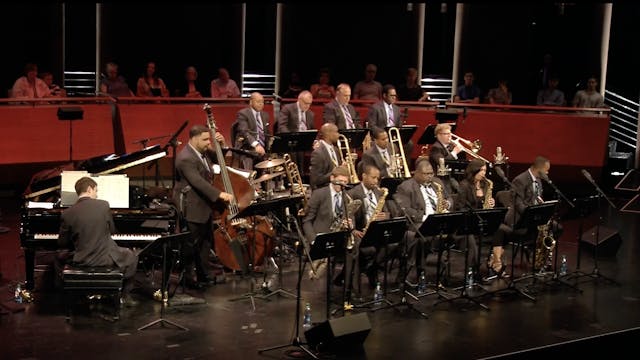Black, Brown, and Beige and The Best of Basie
Dive into Jazz History
•
1h 48m
The Jazz at Lincoln Center Orchestra with Wynton Marsalis play essential big band music by Duke Ellington and Count Basie. The first set finds the JLCO swinging through a number of classic Basie standards, including "April in Paris," "Swinging the Blues," and "Jumpin' at the Woodside." The second half of the concert will be a full performance of Ellington's groundbreaking masterpiece Black, Brown & Beige. Originally composed for his 1943 debut at Carnegie Hall, it was advertised as "Duke Ellington's first symphony," and Ellington described the powerful three-movement suite as a "tonal parallel to the history of the American Negro."
Originally performed April 27th, 2018.
Personnel
REEDS
Sherman Irby - alto saxophone
Ted Nash - alto saxophone
Victor Goines - tenor saxophone
Julian Lee - tenor saxophone
Paul Nedzela - baritone saxophone
TRUMPETS
Ryan Kisor
Kenny Rampton
Marcus Printup
Jonah Moss
Wynton Marsalis
TROMBONES
Elliot Mason
Chris Crenshaw
Sam Chess
Kaspari Sarikosi
RHYTHM
James Chirillo - guitar
Dan Nimmer - piano
Carlos Henriquez - bass
Marion Felder - drums
WITH
Eli Bishop - violin
Brianna Thomas - vocals
Up Next in Dive into Jazz History
-
Cool School & Hard Bop: The JLCO with...
Featuring iconic works from Miles Davis, Art Blakey, Max Roach, and more, Cool School & Hard Bop—music-directed by JLCO saxophonist Sherman Irby and pianist Joe Block—explores the enduring appeal of mid-century jazz through striking arrangements, mellow tones, virtuosic vocabulary, and a commitme...
-
The Swing Era: Revolution in Rhythm
The Jazz at Lincoln Center Orchestra with Wynton Marsalis showcases the timelessness of swing as a genre, cultural period, and musical concept. The big bands that emerged during the Swing Era defined the sound of America – bringing people out of the Depression and ushering in a new sense of possi...
-
Lush Life: Celebrating Billy Strayhorn
Legend has it that Billy Strayhorn (1915-1967) wrote the American songbook icon, “Lush Life,” at the tender age of 16. Though this early date has been disputed by some scholars, what isn’t in question is that Duke Ellington's first recordings of Strayhorn’s work were published when Strayhorn was ...



